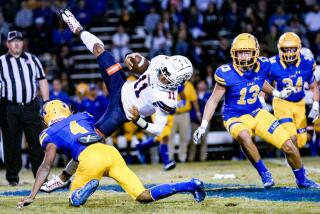Young Missionary Musters the Strength for His Leap of Faith
- Share via
RESEDA — With family and friends gathered around him, his hands slightly shaking, Steven Davis tore open the envelope last spring and read his future: Buenos Aires.
In those two words, Davis, 19, learned where he would spend the next two years of his life as a missionary for the Church of Jesus Christ of Latter-day Saints.
He is among some 45 Mormons from the San Fernando Valley who went to Provo, Utah, this summer for language training and religious study.
Before boarding the plane for Buenos Aires late last month, he spoke of his enthusiasm for his journey.
“I’m a lot more outgoing now. I can speak some Spanish,” he said by phone from Salt Lake City International Airport. “It has given me a kind of goal, a mission in life.”
Davis, who had never been away from home before this summer for more than two weeks at a stretch, said he marked his application with a preference for overseas service.
“It’s part of the adventure,” he said. “It would be a great thing to get a new culture, a new language, a different kind of people. But after realizing I am going to a different country, it’s a little scary.”
In South America, Davis will preach the gospel, seek converts and learn more about the Mormon Church.
He will join the ranks of about 60,000 Mormon missionaries worldwide, 75% of whom are men between the ages of 19 and 26. Most are in a non-English speaking country.
Although missionary work is not a requirement for young Mormon men, about 60% of them do it.
Davis, a former Pierce College student who has been accepted at Brigham Young University, deferred his studies until after the mission.
“Every worthy young man is encouraged to go. Young women don’t have the same responsibility, but are welcome to go if they desire,” said Joseph P. Zollinger, bishop of the Reseda Ward, where the Davis family attends church.
Davis practiced this spring with missionaries stationed in the Valley. The experience was a bit awkward at first.
“You’re afraid you might run into one of your friends or something,” Davis recalled. “It’s just something you have to get over.”
An Uplifting Experience
On a practice run in Reseda, Davis sported the required look--short hair, white shirt, tie and dark slacks. He acknowledged he was nervous (“Here is the unknown and I have to do it”) even though he was accompanied by two experienced missionaries, Jason Holt and Eric James.
Holt and James, who get around their Reseda-Van Nuys territory on bicycles, said their visits with the public are usually smooth and pleasant, but there have been a few close calls. Holt, 20, said his scariest moment occurred one evening last fall in Van Nuys when a hostile man approached on a bicycle trying to sell him drugs.
“I said, ‘We’re just trying to share the message of the Gospel.’ Then he said we were cool and he crossed himself,” said Holt, who is from Alabama.
James, 19, of New Mexico, said he has been chased by dogs about half a dozen times. And his quick-release bike seat was stolen once, forcing him to ride home standing above the missing seat for two miles.
On this particular day, the trio visited Daniel Garcia, who wants to strengthen his Mormon faith, and his wife, Siu Nie.
“I was raised in it, but I never followed the real guidelines,” said Daniel Garcia, 33. “I was being myself, doing my own thing. Now I’m in a stage of responsibility and it will take me where I want to go with my family.”
In their apartment, the Garcias’ 2-year-old daughter, Adrianna, sat on James’ lap as he and Holt discussed a pre-life, when there were only spirits with no bodies.
Davis joined the conversation. “We’re free to make choices here--it’s essential to what happens after we die,” he said, blushing a little.
After discussing the Mormon prohibition against tea containing caffeine--Holt told the Garcias they may drink herbal teas--the missionaries bade farewell.
Missionaries Can’t Be Shy
Outside, the missionaries walked back to the minivan Davis had borrowed from his father.
“It felt pretty natural. I didn’t feel too nervous,” Davis said. “It was an uplifting experience. I liked it.”
Perhaps the biggest hurdle Davis has had to overcome is his shyness. “Having to learn another language and being forced to talk with other people will work on that,” said Davis, who went to high school at the Sherman Oaks Center for Enriched Studies.
“Without a doubt, a lot of young people who go on missions may be socially backward when they leave,” Zollinger said. “But then they return as very confident young men and women, because they spend hours talking to people.”
Missions also make the young men more attractive husbands to Mormon women, said Sonja Eddings Brown, a spokeswoman for the Latter-day Saints in the San Fernando Valley.
“It says a lot about a man who has demonstrated a willingness to make that commitment and who is willing to sacrifice for other things,” Brown said.
Zollinger interviewed Davis and recommended him for a mission. Candidates must pass medical and dental examinations and live according to Mormon moral codes, he said.
Missionaries also are expected to pay their own way; if they are financially strapped, the church helps pay their expenses.
“We’ve been saving since he was born, hoping he wants to do that,” said Davis’ mother, Sue Davis, 52.
Sue and Mel Davis will spend about $375 a month to support their son’s stay overseas, or about $9,000 over the next two years. The church picked up his air fare to Utah and Argentina.
Davis also needed an extensive, if simple, wardrobe for his missionary work: 10 white shirts, two suits, three or four pairs of dark dress slacks, five conservative ties and winter clothing.
But due to airline luggage restrictions on how many bags passengers can bring, it isn’t easy for missionaries to take all they will need.
“They wear heavy coats and stuff their pockets like someone fleeing a country,” joked Sue Davis.
He also needed two pairs of sturdy, comfortable shoes. He will not have a bicycle during the assignment but he can sometimes take public transportation. He will walk about 20 miles a day in Buenos Aires.
Going a Long Way From Home
Davis will be paired with a male missionary, although his partner will change every three months in an effort to avoid boredom or friction between companions.
Along with Mormon prohibitions against tobacco, alcohol, tea and coffee, Davis also will not be permitted to date, have a television or go to movies. Classical music is allowed, Brown said.
“Just no Ozzy Osborne,” Brown joked. “They can watch the Super Bowl if they’re at someone’s house.”
He will be allowed to call his parents only twice a year: on Christmas and Mother’s Day. The rest of his communications with them will be by mail.
Like any overseas adventure, there will be risks. In the past, missionaries have been beaten, robbed and kidnapped. A few have been killed in Russia, Peru and Bolivia.
“He will get an eye-opener to how the real world is out there,” said Mel Davis.
Although the Davises have a 14-year-old son at home and a 23-year-old daughter in Provo, they say life at home won’t be the same without their eldest son.
“He’s an intellectual kid--he enjoys talking about music and politics,” Sue Davis said. “I’m going to miss that a lot.”
Mel Davis said he knows his son will experience moments of loneliness, but believes he is ready.
“He’s progressed as much as he can progress here,” said Mel Davis, a workers compensation claims adjuster. “Raising kids is all about making them ready to go out into the world. If they’re ready to do that, you’ve done your job.”
More to Read
Sign up for Essential California
The most important California stories and recommendations in your inbox every morning.
You may occasionally receive promotional content from the Los Angeles Times.










